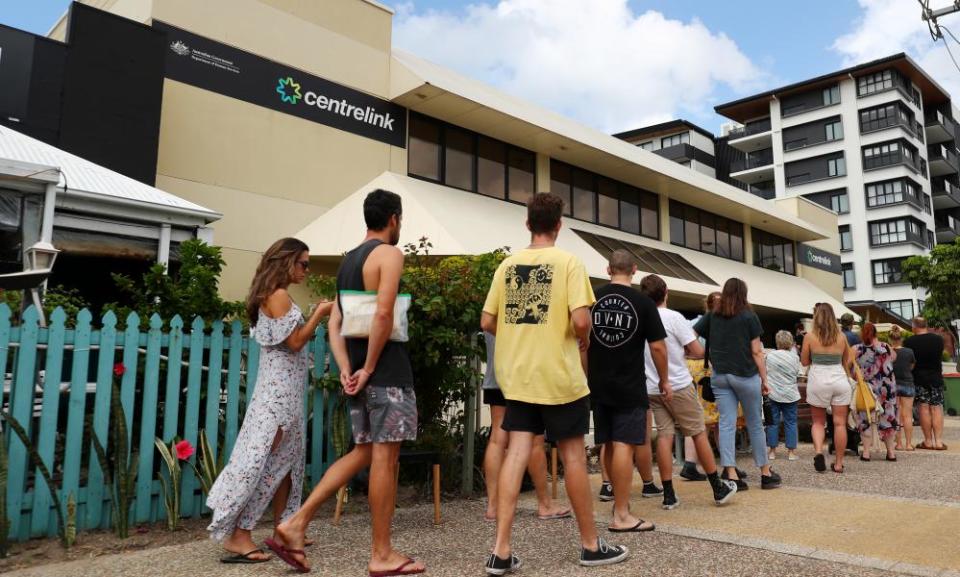Government halts star ratings for employment services amid jobseeker crackdown

A “star ratings” system that ranks the performance of employment service providers has been indefinitely suspended just as the federal government ramps up audits on job applications filed by unemployed Australians.
The decision, explained in a letter to providers, was blamed on changes to data collection resulting from “volatile economic conditions” but advocates for unemployed people have argued it was “galling” the ratings were being stopped amid a crackdown on job seekers.
As it announced a $50-a-fortnight increase to welfare benefits last week, the government outlined a new hotline for employers to report job seekers who do not take up “suitable” work and said it would ramp up audits of welfare recipients’ job applications.
In early February employment service providers – which are privately run by for-profit or non-profit organisations – were told they would no longer be subjected to the public star ratings system.
Related: The ‘jobdobber’ hotline is another policy aimed at keeping wages low | Greg Jericho
The quarterly ratings rank the performance of the jobactive providers in 1,700 locations around Australia, as well as the smaller disability employment services program.
Providers were told in early February that the suspension of the star ratings would last until the Australian Bureau of Statistics resumes producing a specific labour market dataset and the department was satisfied that the ratings could be calculated fairly. The final ratings until then would be from September 2020.
Some providers privately welcomed the suspension, having warned that the ratings would be compromised by the shifts in the labour market caused by the pandemic.
But Kristen O’Connell, a spokesperson for the Australian Unemployed Workers’ Union, said it exposed the “dramatic contrast” between how the government treated people on Centrelink payments and employment service providers.
“It’s galling that the only system that measures job agency performance, flawed as it is, is being paused while at the same time the government is ramping up monitoring of unemployed people’s activities and introducing even more extreme and pointless ‘mutual’ obligations,” she said.
“It is an open admission that there are simply not enough jobs, and it’s the opposite of what the government should be doing.”
Sally Sinclair, the chief executive of the National Employment Services Association, said performance was still being measured.
“It is important that a transparent performance measurement system is developed,” she said.
Under the privatised employment services system, providers receive “outcome payments” for placing job seekers into work. There are now about 1.3 million people in the jobactive system, up from about 750,000 in March 2020.
That influx prompted some experts, including Simone Casey from thinktank Per Capita, to predict a windfall for the sector.
Casey said the star ratings were based on “employment outcomes” – that is how many job seekers are placed into work – and were intended to reflect “the quality of [providers] relative to labour market conditions”.
“Not having star ratings is recognition of the extent to which Covid has disrupted the labour market, and that the economy has not returned to pre-Covid levels,” she said.
“The stars drive competitive behaviour that’s not always healthy for job seekers but it doesn’t seem fair that pressure’s ramped up on job seekers.”
A Department of Employment Services spokesperson said the ABS had stopped producing a specific labour market dataset “due to the volatility in economic conditions brought on by the pandemic”.
“The jobactive star ratings will remain suspended until robust and reliable data become available again for this purpose,” she said.
Related: Welcome to training for our Put the Heat on a Cheat Helpline | First Dog on the Moon
“In the meantime, the performance data which underpin the jobactive star ratings calculations continue to be updated on a weekly and monthly basis and are available to providers and departmental staff for monitoring purposes.”
The spokesperson noted that the government had other measures to assess provider performance and conducted formal interviews every six months.
Asked about the increased auditing of welfare recipients’ job applications, the spokesperson said the department would increase monitoring of providers to ensure they were determining “whether job seekers’ job search efforts meet requirements”.
A spokesperson for the Department of Social Services, which runs the disability employment services program, said the department was working on a data model for a new star ratings system.
“It is important to note that star ratings are one component of the department’s overall assessment of DES provider performance, with provider performance also assessed against factors such as key performance indicators, contractual compliance and quality standards,” she said.

 Yahoo Finance
Yahoo Finance 